CRM software is the central hub for your customer data and sales activities.
In sum: CRM software
CRM software is where the full history of your customer interactions lives, alongside the plan for what to do next.
Here are some of the top options:
- Brevo: Best all-in-one CRM software
- Salesforce Sales Cloud: Most widely used CRM by market share
- Creatio CRM: Best no-code automation CRM software
The goal of any customer relationship management (CRM) solution is usability. If your team can’t easily follow the workflows — whether they’re simple or complex — the system fails.
Below are 10 CRMs with different levels of complexity, each known for excelling in a specific use case.
Table of contents
10 Best CRM software
Disclaimer: This article covers the best CRM software, including our platform, Brevo. The following recommendations are based on use case, market share, and customer testimonials. We do not earn commissions from any affiliate links in this article.
1. Brevo
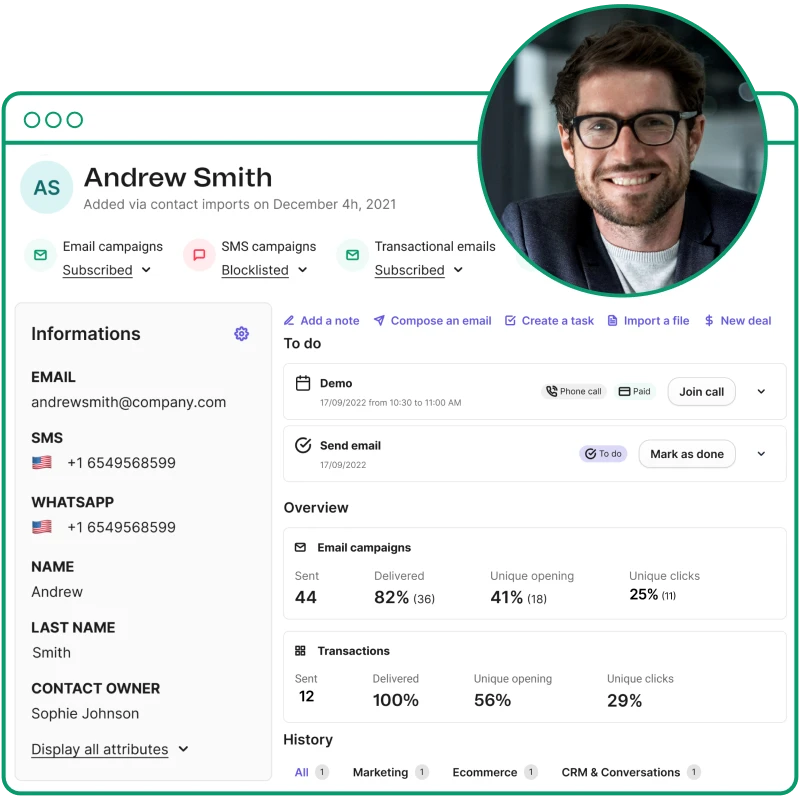
Brevo started as an email marketing platform (Sendinblue) but has grown into a full CRM that’s easy to get up and running.
It’s the best choice if you want something lightweight but still powerful enough to manage customer relationships and campaigns in one place.
With Brevo, you can map the entire customer journey: run inbound campaigns and capture contact information with lead generation forms, follow up with email blasts, and manage pipelines and deals to convert leads. And it doesn’t stop there — built-in customer service tools help you maintain strong relationships and drive long-term customer satisfaction.
What makes Brevo the best CRM software
- Built-in marketing tools — email, SMS, and WhatsApp campaigns are part of every package.
- The generous free plan includes pipeline management, email marketing campaigns, meeting scheduling, and customer service tools (like live chat) out of the box.
- In-app phone calling and video meetings are supported (also included in the free plan).
- CRM features are simple and straightforward.
- Great for small businesses and enterprises alike — you define the limits and add-ons.
- Automation workflows let you set up nurture sequences and follow-ups without extra tools.
- Aura, the AI agent, is available to assist at every step of the workflow: she can generate marketing copy, automate sales pipeline tasks, transcribe calls, and assist in real-time customer conversations.
- Flexible pricing — affordable entry-level plans with options to scale into enterprise-level features.
Brevo pricing
Brevo CRM starts with a free plan that includes generous contact storage, one sales pipeline, and up to 50 open deals. Access to free marketing automation and customer service tools is included, too.
To unlock unlimited pipelines and open deals, the Sales Essentials plan is $31/month.
2. Close
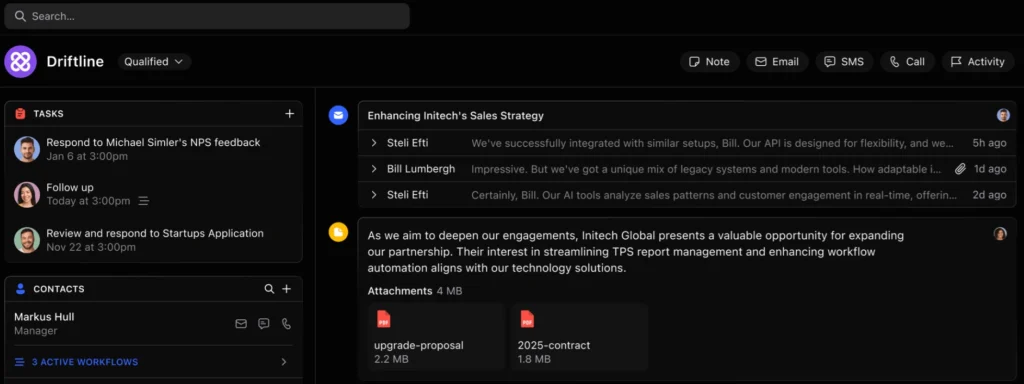
Close is a small business CRM solution for sales teams. It doesn’t have the marketing automation features of Brevo, but doubles down on outreach and deal management.
It’s got handy project management and team collaboration tools, and the automated activity logs make sure nothing falls through the cracks. Everything’s designed to be fast and flexible.
What makes Close the best CRM software
- Close centralizes all outreach in one place, with built-in calling, emailing, and SMS.
- The Power Dialer and predictive dialing save reps a lot of time on high-volume outbound (this one is praised most).
- Pipeline management is simple and straightforward.
- Reporting dashboards clearly track activity, conversions, and team performance.
- An AI assistant helps with email writing, lead enrichment, summarization, and suggestions on the next steps.
- It’s fast, efficient, and easy to adopt.
Close pricing
Close CRM supports up to 10,000 contacts on the Solo plan at $9/month (max. 1 user). The full CRM starts at $49/seat/month with unlimited contacts and leads. Automated workflows are available from $109/seat/month.
3. Monday
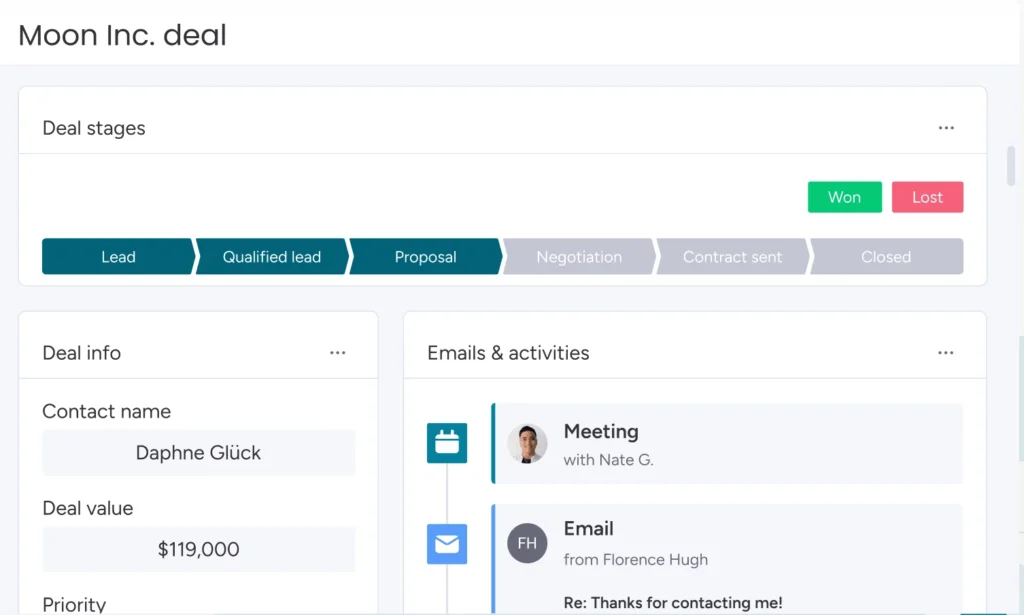
Monday isn’t just a project management tool anymore — it’s grown into a CRM system that’s flexible enough to handle sales, marketing, and customer success workflows.
If you already use Monday for project management, the experience will feel really familiar — the boards, columns, and drag-and-drop interface carry over, so there’s almost no learning curve. Moving deals through stages feels just like moving tasks through a workflow.
The only pitfall, though, is migrating to Monday CRM from other systems — mapping contacts and accounts can be tricky and usually needs extra setup and automations. And because the Monday CRM is still fairly new, there aren’t a ton of tutorials to help explain things if you get stuck.
What makes Monday the best CRM software
- Everything is drag-and-drop and visual.
- Project management is still at the core of the platform, which is reflected in strong productivity tools and collaboration features.
- Tracking customer interactions, managing leads, and collaborating with your team all happen in one place.
- Reporting dashboards are fully customizable.
- AI-powered assistant, Monday Sidekick, helps with risk detection, extracting and organizing CRM data, routing tasks, and more.
- It scales easily — small teams can get started quickly, while larger teams can build complex workflows and integrate with other tools.
Monday pricing
No free plan on Monday CRM. Starts at $15/seat/month with unlimited contacts, pipelines, and boards. AI tools are available from $20/seat/month, and email sequences start at $33/seat/month.
4. Salesforce Sales Cloud
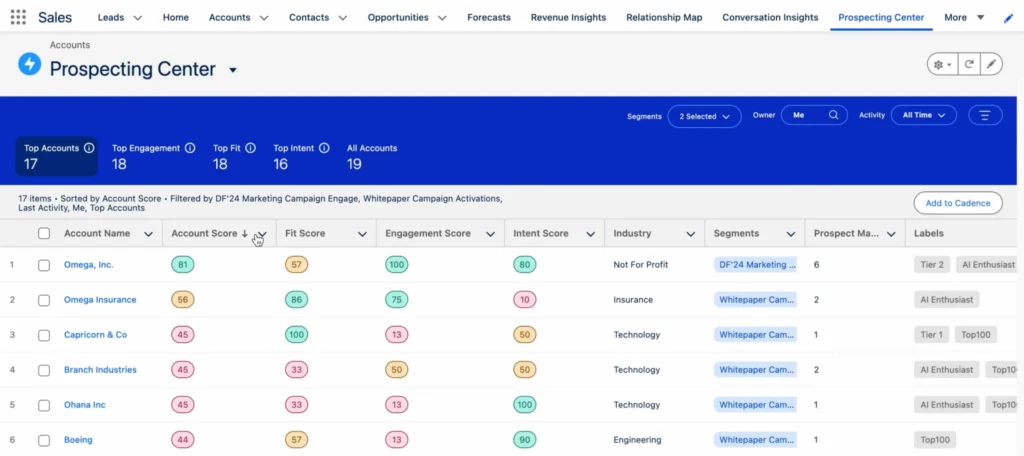
Salesforce Sales Cloud is a CRM by Salesforce that can do anything you want it to do.
Sales Cloud isn’t the kind of CRM you just open and run with — most of its strength comes from how customizable it is. That’s a huge plus if you need a system tailored to your sales process, but it also means setup takes time and usually requires some fine-tuning (or even outside help).
What makes Salesforce Sales Cloud the best CRM software
- You can adapt it to match almost any sales process, no matter how specific.
- Works for startups and enterprise-level companies alike.
- Starter Suite covers the essentials — email templates, nurture sequences, and lead tracking baked in.
- Connects with thousands of apps and tools, making it easy to fit into your stack.
- Offers deep insights into your pipeline, forecasting, and team performance.
- Salesforce has a huge marketplace (AppExchange) and community, plus plenty of resources for support and training.
- Einstein GPT, Copilot, and Agentforce bring AI into lead scoring, forecasting, drafting responses, and even building custom chatbots.
Salesforce Sales Cloud pricing
Salesforce doesn’t offer free plans. The Essentials plan starts at $25/user/month and covers core sales features like contact and opportunity management, email integration, and basic reporting.
Discover more Salesforce alternatives.
5. Creatio CRM
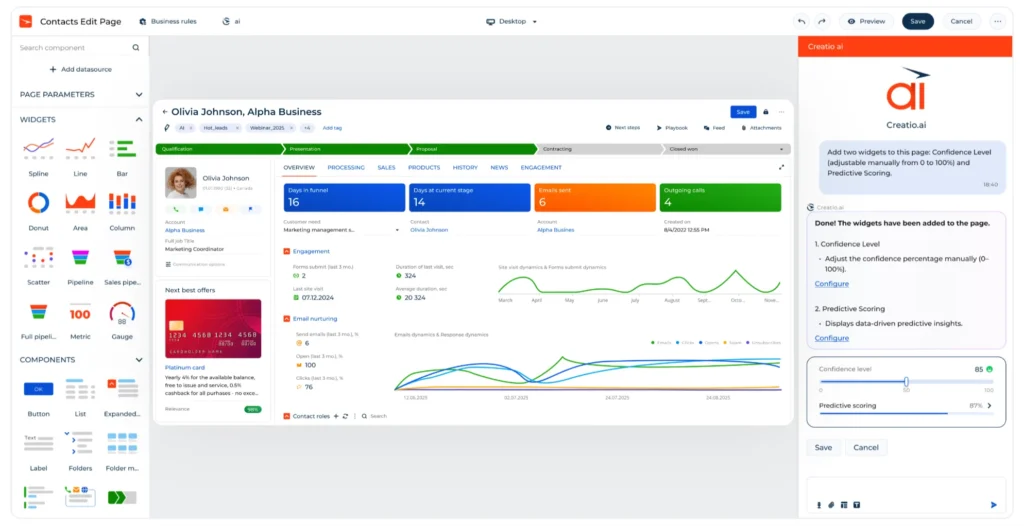
Creatio CRM is an sales automation-first CRM that gives you no-code and low-code tools to build workflows your way. The process designer lets you build out complex workflows, like automatically routing leads, escalating service tickets, or generating documents, without needing developer support.
Of course, Creatio takes some time to set up and customize compared to out-of-the-box CRMs. But once it’s configured, it becomes a powerful hub for automating not just lead management, but business processes across the board.
The system is best suited for teams, not solopreneurs, as the minimum package requires five users.
What makes Creatio the best CRM software
- Creatio blends CRM with a no-code platform.
- It’s highly customizable yet simple.
- Sales, marketing, and service management are all part of the same system.
- AI-powered tools help with lead scoring, forecasting, opportunity management, and customer insights.
- Strong workflow automation features make it easy to set up approval flows, reminders, or escalations that keep deals and support cases moving.
- Integrates smoothly with other apps, thanks to an open API and marketplace of prebuilt connectors.
Creatio pricing
Starts at $25/user/month with a five-user minimum. All plans include an unlimited number of workflows and records.
6. Hubspot
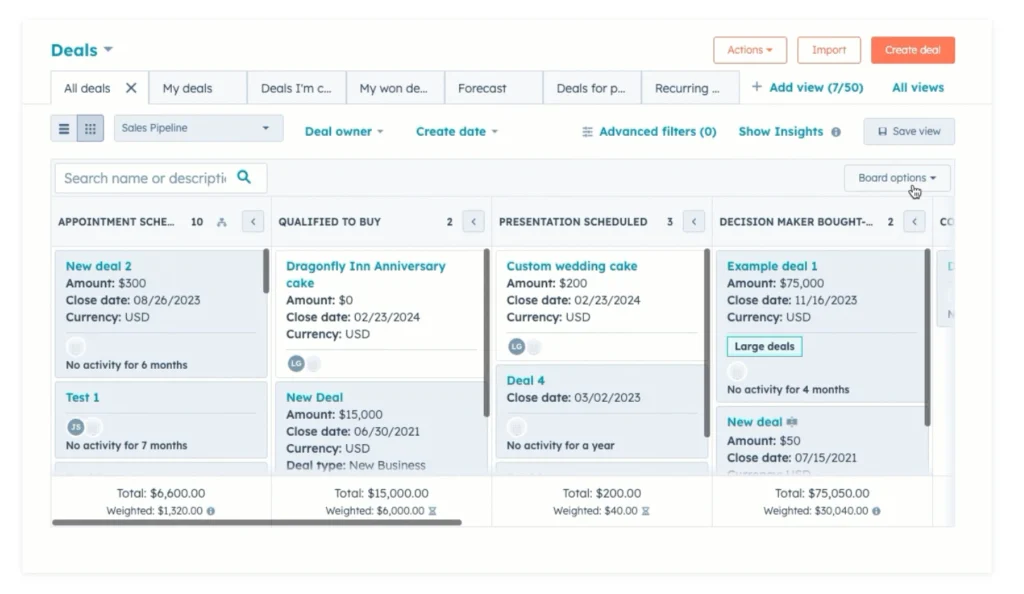
HubSpot CRM is a popular all-in-one platform with integrated CRM capabilities.
Out of the box, you get contact management, deal tracking, and pipeline views without extra setup. As your business needs grow, you can expand into HubSpot’s other “Hubs” for marketing, customer service, and operations. For sales teams specifically, the Sales Hub is the most relevant upgrade, unlocking advanced tools for automation, reporting, and forecasting.
Like Brevo, HubSpot CRM comes with a generous free plan that gives you a taste of nearly all of HubSpot’s functionality. But the limits are fairly tight, so it’s really best suited for individuals or very small businesses with simple needs.
What makes HubSpot CRM the best CRM software
- Clean and user-friendly interface.
- Strong contact and deal tracking with customizable pipeline views.
- Free plan covers core CRM and sales tools.
- Use cases span across marketing, sales, service, and operations.
- Powerful automation, reporting, and decent customizability once you move into paid plans.
- Large ecosystem of integrations and a very strong knowledge base.
HubSpot CRM pricing
The free plan includes most essentials, except sequencing. Sales Hub Starter unlocks basic automation at $15 per seat/month.
You can also choose the Customer Platform Starter for $15 per seat/month, which bundles sales with marketing, service, and other starter tools. Upgrading beyond this can get expensive ($1,450/month vs $100/month for Pro Sales features), so if you don’t need extras, sticking with Sales Hub is usually the better choice.
Discover more HubSpot competitors.
7. Pipedrive
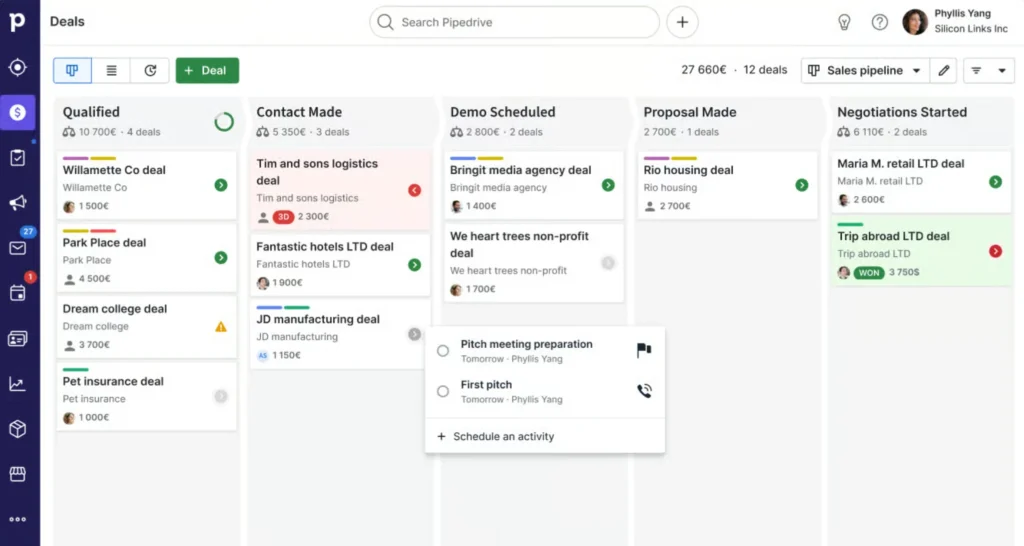
Pipedrive is a powerful B2B CRM. Built specifically for salespeople, it keeps deal management straightforward instead of trying to do everything.
If you already have a lead generation system in place and don’t need cold outreach, Pipedrive is a solid choice for moving leads through your pipeline.
While it integrates with plenty of tools, it doesn’t include built-in marketing features like Brevo or HubSpot. For those, you’ll need to purchase Pipedrive’s add-ons—often pricey—or connect it to your email marketing or customer engagement platform.
Pipedrive’s add-ons cover prospecting, chatbots, website traffic analysis, email marketing, document management, and project management.
What makes Pipedrive the best CRM software
- Pipeline view makes deal management effortless.
- It’s easy to train people who don’t have experience with traditional CRMs on the system.
- AI assistant suggests next actions based on deal activity.
- Plays nicely with other tools — but intentionally sticks to being “sales-first.”
Pipedrive pricing
Plans start at $24/user/month for 2,500 leads and deals per user. Automation is available from $49/user/month. AI features like next-step recommendations and copy generation start at $79/user/month.
Discover more Pipedrive alternatives.
8. Bigin by Zoho CRM
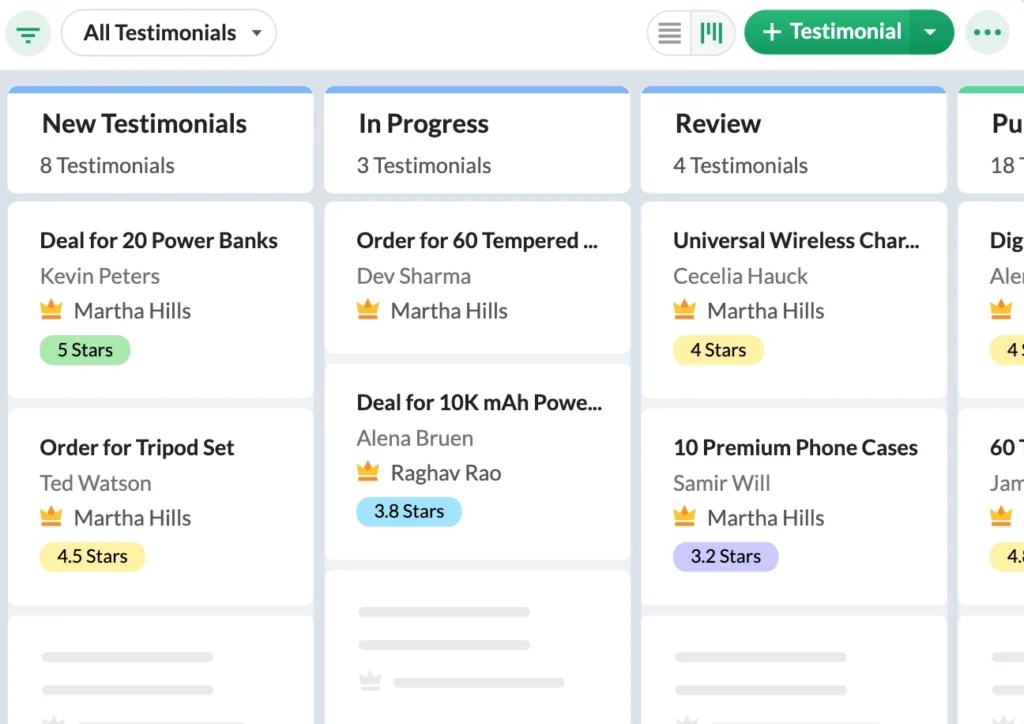
Bigin is Zoho’s lightweight CRM designed for small businesses and teams that need something simple to manage potential customers, track deals, and automate basic workflows. It gives you the essentials without the complexity of a full CRM.
Zoho, the company behind it, offers a huge suite of business apps covering sales, marketing, help desk, finance, and more. At the center is Zoho CRM, a robust platform for larger teams with advanced features and its AI assistant, Zia (note that Zia is only available in Zoho CRM, not Bigin).
Bigin fits in as the “starter CRM,” giving small teams a clean, easy-to-use solution that can grow with the rest of Zoho’s ecosystem.
What makes Bigin the best CRM software
- Bigin is simple and intuitive.
- It’s affordable.
- Clutter-free visual pipelines and automation tools.
- It integrates smoothly with other Zoho apps and popular third-party tools.
- The mobile app UI is great.
Bigin pricing
Free plan includes 1 pipeline and 500 records. Paid plan starts at $9/user/month with 3 pipelines, 50,000 records, and 30 automated workflows.
Discover other Zoho alternatives.
9. Less Annoying CRM
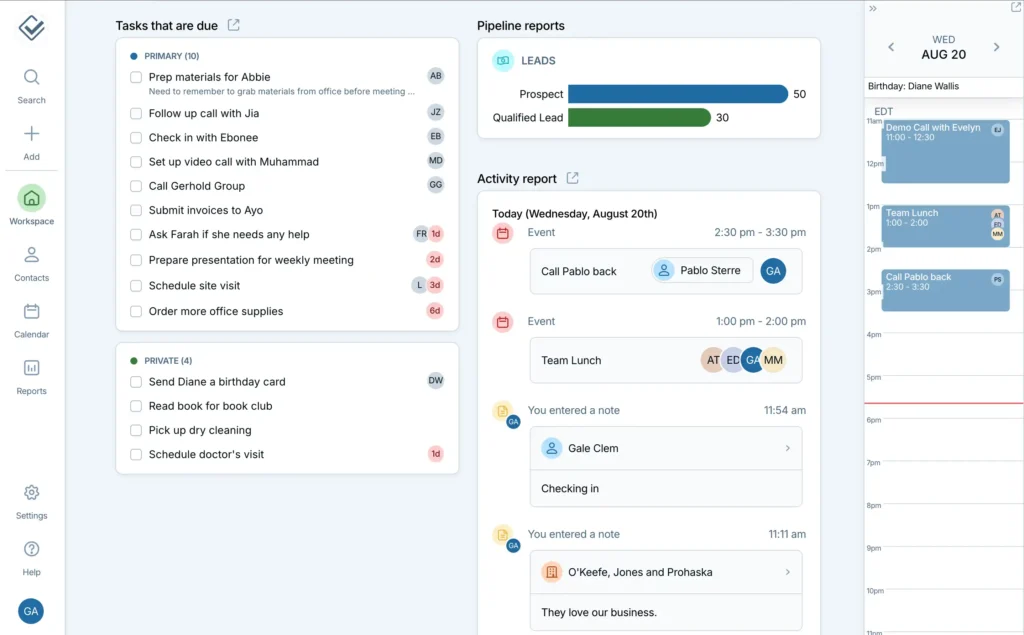
Less Annoying CRM is a favorite among small businesses because it’s just simple. It lives up to its name — it’s straightforward and doesn’t overwhelm you like all-in-one systems may.
Beyond the solid functionality, it focuses on making the entire customer experience… well, less annoying. So even if any issues do arise, their support team typically resolves them quickly.
What makes Less Annoying CRM the best CRM software
- Extremely simple, minimal learning curve.
- Built-in contact and pipeline management.
- Centralized notes and task tracking for deals.
- Affordable, all-inclusive pricing with no confusing add-ons.
- Customer support is highly responsive and hands-on.
Less Annoying CRM pricing
The CRM tool offers an unlimited one-month free trial. The only paid plan is $15/user/month + tax and includes unlimited contacts and pipelines.
10. Copper CRM
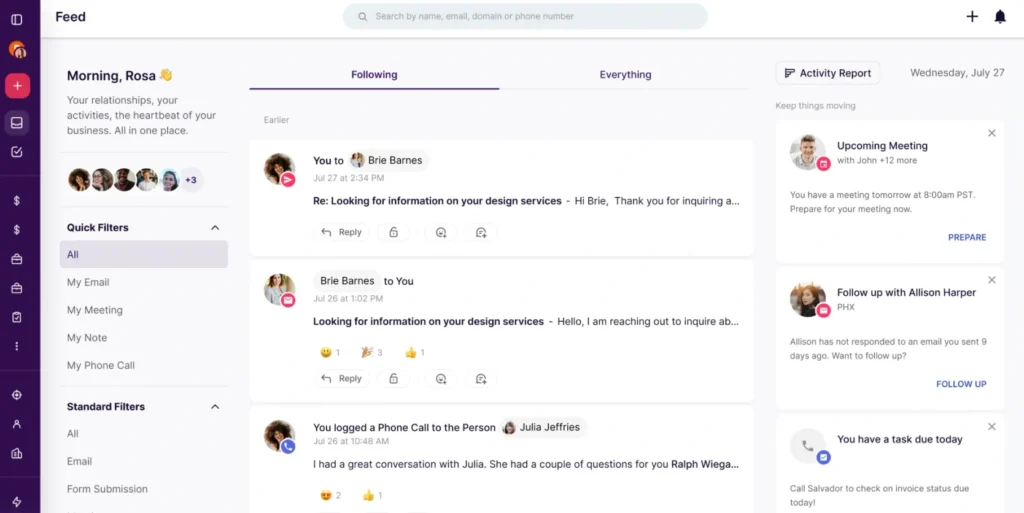
Copper is a CRM built to work seamlessly with Google Workspace. If your team members already use Gmail, Calendar, and Drive (and love it), Copper CRM extends that workflow and makes it more efficient.
The CRM offers pipeline management, task tracking, and reporting, all inside Google’s interface.
What makes Copper CRM the best CRM software
- Deep Google Workspace integration — logs emails, meetings, and docs automatically.
- Intuitive, visual pipeline management.
- AI-powered suggestions for next steps and task reminders.
- Simple automation for follow-ups and repetitive tasks.
- Minimal setup needed for teams already using Google Workspace.
Copper CRM pricing
No free plan, but a trial is available. The Starter plan is $12/user/month and includes up to 1,000 contacts, productivity tools, and email templates. Pipelines and deal management start at $29/user/month. Bulk email and automation features are available from $69/user/month.
How to choose the right CRM platform for your business
Don't know how to choose a CRM for your business? We've got you covered.
When evaluating CRMs, the feature set is important, but it’s not everything. Here’s the checklist to go through.
- Centralized contact management: You want all your contacts and each and every piece of customer information in one place.
- Visual sales pipeline: It’s easier to see where every deal stands when you can actually see it on a board.
- Automation capabilities: Anything you can automate — follow-ups, reminders, task management — take it off your plate.
- Integration with other tools: Your CRM should play nice with the tools you already use, so nothing gets lost between apps.
- Reporting and analytics: The system should help you connect your sales performance to the bottom line. Does it?
- Extra tools: Decide if you need features like email marketing or cold calling — if yes, choose a system that has them; if not, go simple so your team isn’t distracted by clutter.
- AI assistance: Features like smart reminders, lead segmentation, or task suggestions can save you time if they fit your workflow.
- Ease of use: A CRM should be usable in the first place. If your team can’t adopt it, it won’t pay off.
- Scalability: Pick one where adding users, features, or integrations won’t break the bank.
- Customer support and training: Even the best CRM is useless if you’re stuck and can’t get help quickly.







